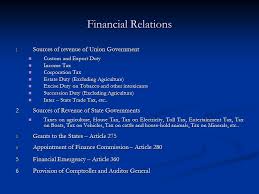Law Notes On – Financial Relation Between The Union And The States – For W.B.C.S. Examination.
India being a federation powers are distributed between the Union and the States. Like other powers financial powers are also distributed between the two sets of government.Continue Reading Law Notes On – Financial Relation Between The Union And The States – For W.B.C.S. Examination.
Article 268 to 293 in Part XII deal with the financial relations. The financial relations between the Union and the States can be studied under the following heads:
- Taxes and duties levied by the Union, but collected and appropriated by the States: Stamp duties and duties of excise on medical and toilet preparations are levied by the Government of India, but collected and appropriated by the States, within which such duties are leviable, except in the Union Territories, where they are collected by the Union Government (Art. 268). The proceeds of these duties levied within any State are assigned to that State only and do not form a part of Consolidated Fund of India.
Service tax levied by the Centre, but collected and appropriated by the Centre and the States: Taxes on services are levied by the Centre, but their proceeds are collected and appropriated by both the Centre and the States. Principles of their collection and appropriations are formulated by the Parliament.
- Taxes levied and collected by the Union, but assigned to the States within which they are leviable (Art.269):
a) Succession duty in respect of property, other than agricultural land.
b) Estate duty in respect of property, other than agricultural land.
c) Terminal taxes on goods or passengers carried by railways, sea or air.
d) Taxes on railway fares and freights taxes on transactions in Stock Exchanges.
- Taxes levied and collected by the Union and distributed between the Union and the States (Art.270): Certain taxes are levied as well as collected by the Union, but their proceeds are divided between the Union and the States in a certain proportion in order to effect an equitable distribution of the financial resources.
This category includes all the taxes and duties referred to in the Union List, except the three categories mentioned above, any surcharge and any cess levied for specific purposes. The manner of distribution of net proceeds of these taxes is prescribed by the President, on the recommendation of the Finance Commission.
- Surcharge on certain taxes (Art.271): The Parliament is, authorized to levy surcharge on the taxes mentioned in the above two categories (Art.369 and Art.370) and the proceeds of such surcharges go to the Centre exclusively and are not shareable.
- Taxes levied and collected and retained by the states: These are the taxes enumerated in the State List (20 in number) and belong to the States exclusively.
- Grants-in-Aid: The Parliament may make grants-in-aid from the Consolidated Fund of India to such States as are in need of assistance (Art.275), particularly for the promotion of welfare of tribal areas, including special grant to Assam.
These are called statutory grants and made on the recommendation of the Finance Commission. Apart from this, Art.282 provides for discretionary grants by the Centre and States both, for any public purposes. The Centre makes such grants on the recommendation of the Planning Commission (an extra-constitutional body).
- Loans: The Union Government may provide loan to any State or give guarantees with respect to loans raised by any State.
- Previous sanction of the President (Art 274): No Bill or amendment can be introduced or moved in either House of Parliament without the previous sanction of the President, if:
- It imposes or varies any tax in which the States are interested; or
- It varies the meaning of the expression “Agricultural Income” as defined in the Indian Income-Tax Act; or
- It affects the principles on which money are distributed to the States; or
- It imposes a surcharge on the State taxes for the purpose of the Union.
- According to Article 301, Freedom of Trade, Commerce and Intercourse throughout the territory of India is guaranteed, but Parliament has the power to impose restrictions in public interest.
- Although taxes on income, other than agricultural income, are levied by the Union, yet the State Legislatures can levy taxes on profession, trade, etc.
- Distribution of non-tax revenues: Non tax revenues from post and telegraph, railways, banking, broadcasting, coinage and currency, central public sector enterprises and escheat (death of a person without heir) and lapse (termination of rights) go to the Centre, while State receives non-tax revenues from irrigation, forests, fisheries, state public sector enterprises and escheat and lapse (if property is situated in that state).
- Provision has been made for the constitution of a Finance Commission to recommend to the President certain measures for the distribution of financial resources between the Union and the States (Art.280).
Under the situation of emergencies, these financial relations also undergo changes according to the situation and the President can modify the constitutional distribution of revenues between the Centre and the States.
Please subscribe here to get all future updates on this post/page/category/website


 +919674493673
+919674493673  mailus@wbcsmadeeasy.in
mailus@wbcsmadeeasy.in







































































































